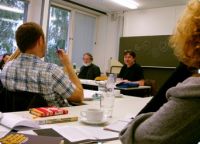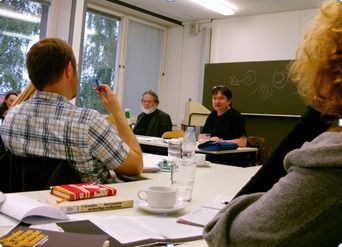Joint Prague-Erlangen Seminar on Adorno
 On 9 May 2014 a group of students from the Theological Faculty in Prague set off to spend the weekend in Erlangen, in order to read passages from Adorno’s “Aesthetic Theory” together with a similar group of Erlangen theology students.
On 9 May 2014 a group of students from the Theological Faculty in Prague set off to spend the weekend in Erlangen, in order to read passages from Adorno’s “Aesthetic Theory” together with a similar group of Erlangen theology students.
These bilateral meetings already have quite a long tradition. They date back to Dr. Jan Kranát’s study visit to Erlangen in 1999-2000. Since that time these joint seminars have taken place regularly.
The seminar in Erlangen was launched by Prof. Wolfgang Schoberth with a lecture entitled “Introduction to the Thought of Theodor W. Adorno.” Next day we read the first pages from “Aesthetic Theory”. Already the first sentence refers to the existential uncertainty of art, which, although it is autonomous and wants to remain so, must nevertheless maintain a critical relationship to the world. On the one hand it has emancipated itself from religion; on the other, because of the way the world is constituted it cannot affirm this straight out. It also has to come to terms with the mechanisms of the culture industry.
During our stay in Erlangen the Kaiser-Wilhelm-Restaurant became a regular port of call for us. We certainly visited it more often than the other restaurants in Erlangen. After Bismarck had united the small German states, firstly into the North German Confederation, and then, after the war with France, into the German Empire, the Prussian King was crowned as German Kaiser Wilhelm I in Versailles in 1871. So this restaurant would seem to have been quite appropriate for a visit to Germany, even though the loyalty to the Kaiser which is associated with the name appears a little anachronistic today.
On the third day we attended a church service in the Neustadt church. Afterwards we visited the Jewish cemetery and were given an amusing guided tour of the beer cellars on Erlangen Hill. We then fortified ourselves in preparation for the trip back to Prague in the beer garden “Entla’s Keller”.
On 23-25 May the second part of the seminar took place in Prague. Early on Friday evening we welcomed our colleagues from Erlangen – who had been surprised by a shower and were rather wet – at the Protestant Theological Faculty in Prague. Once everybody had been fortified with tea or coffee, the joint weekend got under way with a lecture from Senior Lecturer Jan Kranát. Our spirits were raised by a small guidebook that we had to put together ourselves. After much rustling of paper each of us was finally equipped with a “Paperback on Czech Modern Art for Adorno Readers”. We then moved on to the theme proper, Theodor W. Adorno’s “Aesthetic Theory”. But soon our stomachs made themselves felt and we went to have dinner together and continued our discussions in a nearby restaurant.
The next day was Saturday and the Faculty was like a ghost town. Only on the second floor could be heard the sound of the coffee machine bubbling and our thoughts churning. A close feeling of friendship soon reigned again among the participants, as though it had only been yesterday that we said goodbye to one another in Erlangen. The reading of the texts together, and even more the joint discussions, were very stimulating and enriching. And in typical critical Adorno style we came to the conclusion that “if we do not feel at ease when we hear techno music or light entertainment music”, then this, too, is “only something we have become trained to do”.
This exchange, which takes place every two years, is genuinely enriching for all those taking part. How can we as theologians read Adorno and other philosophers, and how do colleagues who do not have German as their mother tongue understand these texts?
On Sunday we attended together a church service held by the German-Speaking Protestant congregation in Prague, and rounded off the joint weekend with some refreshments in the beautiful “Café Imperial”.
And so our colleagues from Erlangen left us, taking with them plenty of new ideas to think about and new contacts. The contacts will continue. Plans are already taking shape for the next meeting and we are all looking forward to it.
Sophia Höff and Sophie Poland
